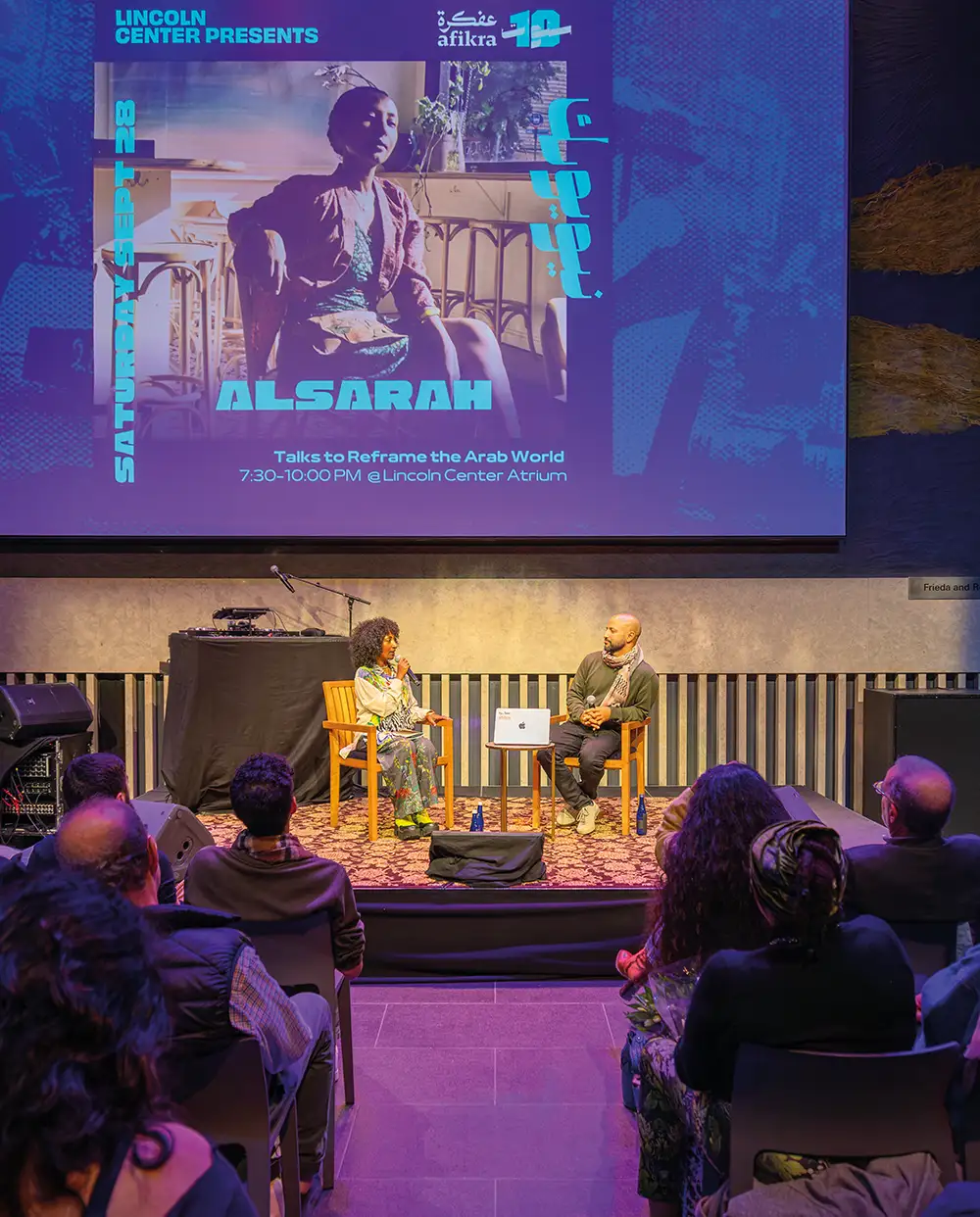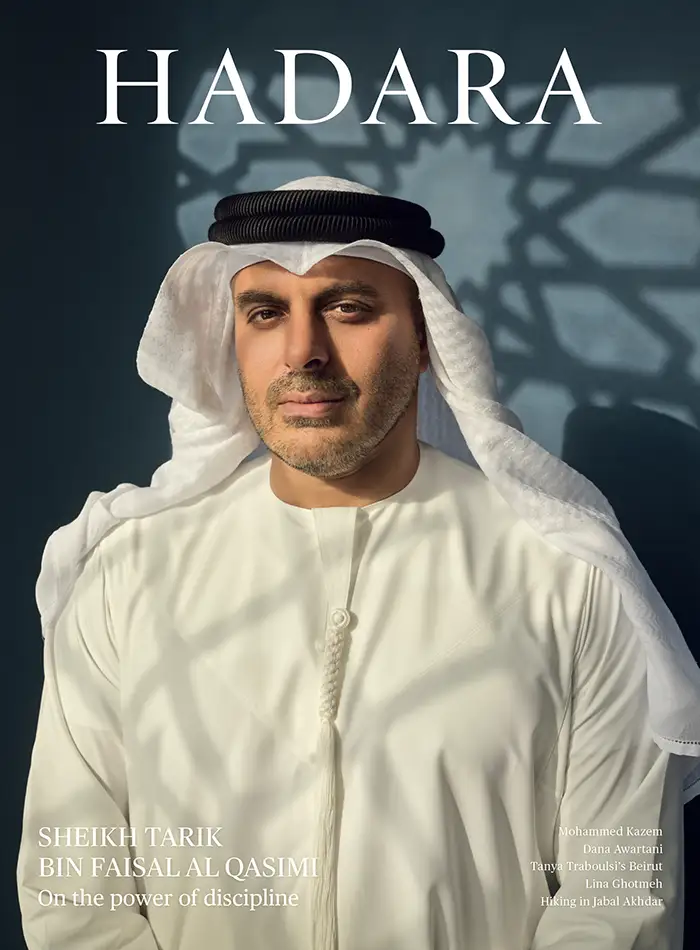Crowdsourcing the future
Afikra has created a global community passionate about the history and culture of the Arab world.
By India Stoughton
Photos by Tanya Traboulsi
Muhanna says. Through Afikra, he hopes to reignite a sense of curiosity in the Arab world. The platform’s name, derived from colloquial Lebanese Arabic, translates to “on second thought” or “come to think of it”—a playful reflection of its mission to induce a spirit of enquiry in its followers.
Generally free and open to all, its live presentations span a vast array of topics, from art, food and culture, to science, technology and industry. All events are available to stream on the platform’s website, a seemingly bottomless archive of information.
Over the years, the platform has expanded beyond Afikra Community, its programme of live events. Afikra Academy, the educational outreach programme run in collaboration with the University of Chicago and the University of Texas at Austin, offers courses and workshops about the Arab world, an annual virtual youth summit, and free resources and lesson plans for teachers. These courses go beyond a standard history lesson, offering programmes such as “Arabic Melodies in Harmony,” which pairs history and information about Arabic music with choral arrangements for student choirs.
Afikra Media includes Daftar, a monthly journal featuring essays and interviews inspired by the platform’s talks and podcasts, as well as the Quartertones Mixtape, monthly playlists created in collaboration with everyone from record-shop owners to critics and musicians, focusing on music from the Arab world.

Afikra now stages live events in 30 cities, in and beyond the Arab world. Last September, marking the platform’s 10th anniversary, Afikra hosted a series of talks at New York’s Lincoln Center. Photo: Daleelah Saleh @medialeelah.
The Afikra Podcast, the platform’s flagship series featuring experts from academia, art, media, urban planning and beyond, can be streamed free on Anghami, Apple and Spotify. It features weekly episodes ranging from the light-hearted to the weighty, from reflections on how to incorporate Egyptian flavours into French pastries, to a history of disease in Al-Andalus, to the unexpected links between the deserts of Arizona and the Arabian Peninsula. Fast approaching 500 episodes, it is one of more than 20 themed podcast series Afikra produces, spanning music, film, television, literature, food culture and design, as well as history, economics and geopolitics. The pace at which new episodes are produced is staggering, with new recordings released almost daily.
From the beginning, Muhanna has en- couraged those interested in the platform to become active participants, whether that means launching a new chapter in a new city or giving a community presentation at a live event. While podcast guests are experts in their fields, Afikra’s live presentations are often given by community members with a personal, rather than professional, interest in the topic at hand. “I’ve done these workshops all around the world where I basically spin three different wheels,” Muhanna says. “One is a random city or place, another is the subject matter, like fashion or sports or photography or literature, and the third is a time period.” Depending on a participant’s interests, they might end up choosing to research sports in Tunis in the 1920s or cooking in Aleppo in the 1960s. “There are stories everywhere,” he says. “So go and find some.”

Muhanna, who hosts the majority of the podcast episodes, leads by example. He is an entertaining and astute interviewer, asking questions that make even the most technical or academic subjects engaging and accessible. A self-described nerd, he studied economics and jazz at Duke University in the US, then worked in finance, actuarial consulting and public policy, as well as education. It was while working as a teacher in New York that he realised he had lost his own sense of curiosity, in particular about his homeland of Lebanon and the Arab world, from which he felt an increasing sense of dislocation.
“I had a bunch of Arab friends—Saudi, Palestinian, Egyptian, Lebanese, Syrian—and all of us used to hang out all the time and do intellectual things,” he says. “We’d go to see shows or go to hear music or talk about films or talk about what books we liked, but when it came to doing ‘Arab’ things I noticed we [tended to choose more stereotypical activities], and it didn’t look like the rest of our personalities.”
His first talk, held in September 2014 at a friend’s house, was on the subject of the Pen League—a collective of Syrian and Lebanese American writers and scholars living in New York in the 1920s who sought to promote and enrich Arabic literature. Its enthusiastic reception made him realise he was not alone in feeling disconnected from his culture. Within a few years, Afikra had gained a loyal following. “People started flying in from other cities,” he recalls.
Afikra is not limited to Arabs or to people living in the Arab world. “One of our core values is interests over identity,” Muhanna says. “And the reason why that matters to me, and why it matters to the ethos and what we’re trying to do, is Afikra is really about staking a claim and saying, ‘I have an interest in this region, I have a stake in it, and I have ownership over the narrative…I can exercise my agency to help contribute to a version of that narrative, a version of the story we tell about this place.’”
This approach champions diverse perspectives. The podcast, with its deep dives into histories that might as easily take listeners to Zanzibar or Malta as Damascus or Marrakech, reflects the inclusivity of this community, people who are “interested in crafting a vision and a version of the Arab world that is creative and compassionate and not hyper-focused on identity…Together, we’re doing this pointillism painting, and everyone’s adding their little pins, and that is creating a new contour and a new topography of what the Arab world is,” he says.
Afikra’s lesson is simple but profound: stories shape reality. “The history of any of these places is constantly being rewritten, and some of it’s being forgotten,” he says. Afikra’s community has the power to shape a communal narrative—and with it a communal future. “That narrative is the reality that we’re living with,” Muhanna says. “It’s the way we tell the story about what this place was, and what it was informs what it is, and what it is informs what it’s going to be.”




